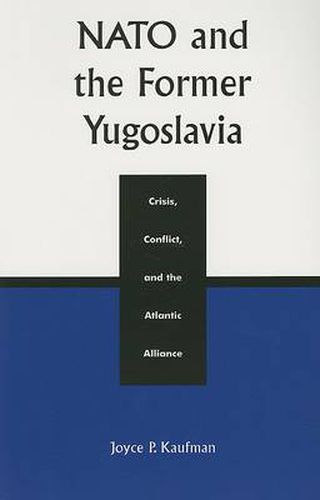Readings Newsletter
Become a Readings Member to make your shopping experience even easier.
Sign in or sign up for free!
You’re not far away from qualifying for FREE standard shipping within Australia
You’ve qualified for FREE standard shipping within Australia
The cart is loading…






Focusing on NATO’s continued crisis of identity, this text argues that the conflicts in Croatia, Bosnia-Hercegovina and Kosovo have proven to be critical to an alliance that has not been able to define its roles and missions in the post-Cold War world. While, on the one hand, NATO was enlarging by inviting former adversaries in Central and Eastern Europe and the former Soviet Union to join, on the hand it has been woefully unprepared to deal with the ethnic conflicts that erupted on its borders and that potentially threaten the peace and stability of Europe. Joyce P. Kaufman contends that the conflicts in the former Yugoslavia have potentially threatened the essence of NATO by forcing the alliance to take on the new role of peacekeeper without adequately allowing the members to examine the role the alliance wants to or should play in a largely post-communist world. Despite ongoing discussion in NATO ministerial summits, the alliance has made little progress and public questions about the role and even the viability of NATO after the Cold War continue to grow. The inability to address these issues leaves NATO facing a number of pressing questions that this work tries to answer: what role can and should the alliance play in the future?; and why have the ongoing conflicts in the Balkans proven to be a challenge that the alliance has been unwilling or unable to resolve?
$9.00 standard shipping within Australia
FREE standard shipping within Australia for orders over $100.00
Express & International shipping calculated at checkout
Focusing on NATO’s continued crisis of identity, this text argues that the conflicts in Croatia, Bosnia-Hercegovina and Kosovo have proven to be critical to an alliance that has not been able to define its roles and missions in the post-Cold War world. While, on the one hand, NATO was enlarging by inviting former adversaries in Central and Eastern Europe and the former Soviet Union to join, on the hand it has been woefully unprepared to deal with the ethnic conflicts that erupted on its borders and that potentially threaten the peace and stability of Europe. Joyce P. Kaufman contends that the conflicts in the former Yugoslavia have potentially threatened the essence of NATO by forcing the alliance to take on the new role of peacekeeper without adequately allowing the members to examine the role the alliance wants to or should play in a largely post-communist world. Despite ongoing discussion in NATO ministerial summits, the alliance has made little progress and public questions about the role and even the viability of NATO after the Cold War continue to grow. The inability to address these issues leaves NATO facing a number of pressing questions that this work tries to answer: what role can and should the alliance play in the future?; and why have the ongoing conflicts in the Balkans proven to be a challenge that the alliance has been unwilling or unable to resolve?